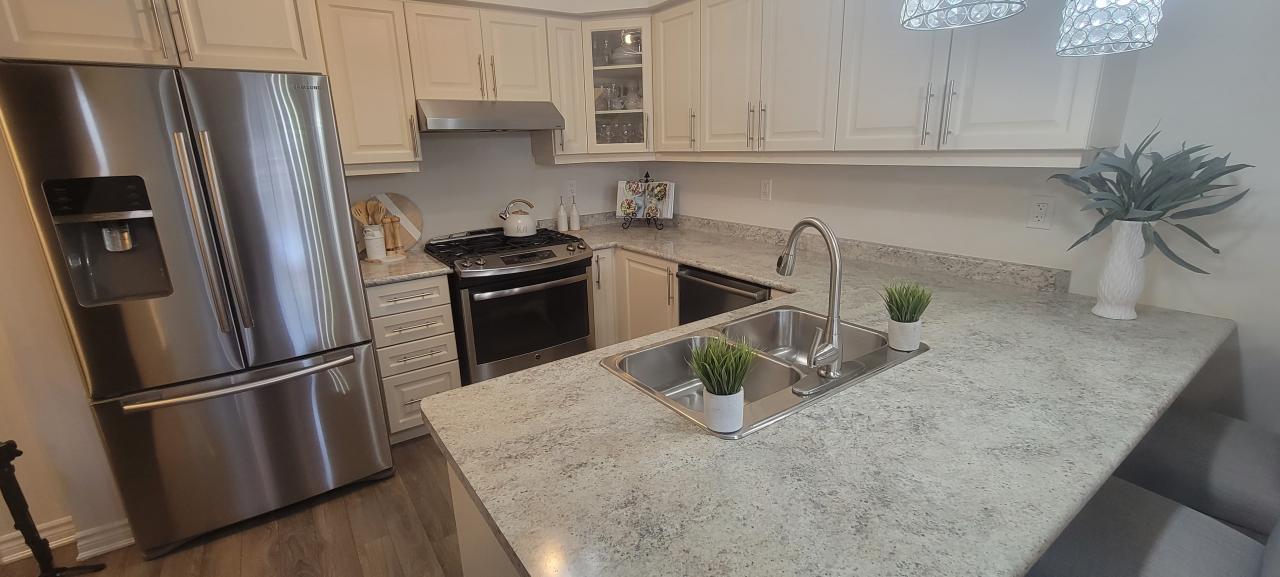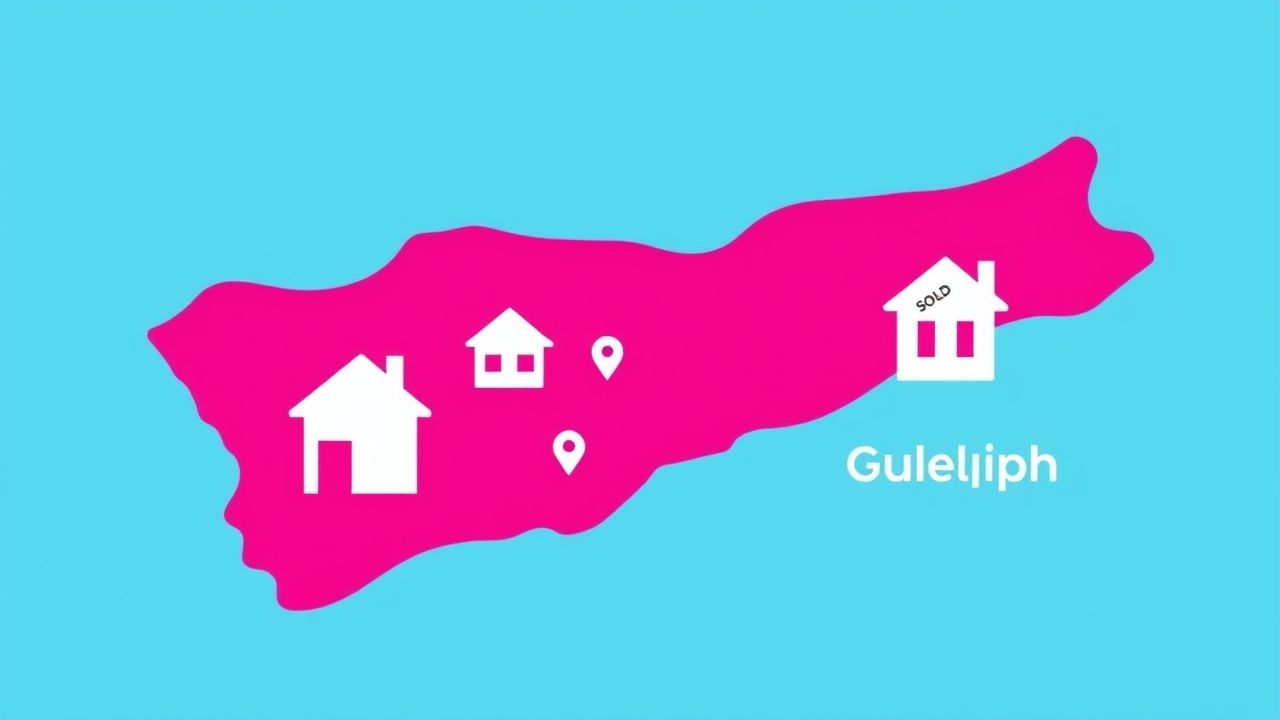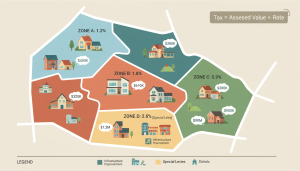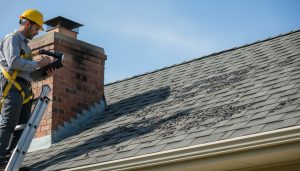Are you confused about buying or selling a home in the crazy GTA market?
It feels like prices go up and down fast. News reports say different things. How do you know what to do? This guide will help. It’s a simple plan for people buying or selling homes in places like Georgetown, Milton, Guelph, Acton, Oakville, and Burlington. We will show you how things work. We will make it easy to understand.
Understanding the GTA Market Maze: What You Need to Know Now
The Greater Toronto Area (GTA) housing market is big and busy. It changes often. Knowing what’s happening helps you make smart choices. Let’s look at the big picture and then zoom in on your town.
GTA Real Estate Market Analysis: The Big Picture (2024-2025)
Things looked up near the end of 2024. More homes sold in November 2024 compared to November 2023. That’s a big jump – over 40% more sales reported by the Toronto Regional Real Estate Board (TRREB). More people also listed their homes for sale. This means buyers and sellers were getting more active.
Why did this happen? Money got a bit cheaper to borrow. When mortgage rates go down, more people can afford to buy. This pushed sales up. Experts think this trend will continue into 2025. Lower borrowing costs usually mean prices might start to climb again, especially for houses.
What about different types of homes?
- Houses (Detached): These got more expensive faster than condos in late 2024. Lots of people want houses with yards. There are not enough houses for everyone who wants one. This pushes prices up, especially in popular areas.
- Condos: Condo prices were not growing as fast. Some even went down a bit in 2024. There were more condos for sale. But, more condos started selling too. Some experts think condo prices might start going up later in 2025 as fewer are left to buy.
“We saw buyers who waited finally jump back in late 2024. Lower rates gave them confidence. i expect 2025 to be busier, especially for family homes.” – Local GTA Real Estate Agent Insight
What about Renting?
Lots of people are renting in the GTA. With more people moving to the area, demand for rentals stays high. But, as buying becomes a bit easier, some renters might become homeowners. This could mean more rental places become available. But high population growth means rent prices will likely stay strong.
Understanding Real Estate Statistics: Don’t Get Fooled
You hear lots of numbers about real estate. Average price, sales volume, days on market. What do they mean for you?
- Average Price: This is just the middle price. Half the homes sold for more, half for less. It can be skewed by very expensive homes. Look at the median price too (the actual middle sale). Also, look at prices for the type of home you want (house vs. condo) in the specific town you like. A GTA average doesn’t tell you about Milton specifically.
- Sales Volume: How many homes sold. High volume usually means a busy market. Low volume means things are slower.
- New Listings: How many homes came up for sale. Lots of new listings mean more choice for buyers. Few listings mean sellers have more power.
- Months of Inventory: How long it would take to sell all current homes for sale if no new ones came up. Low inventory (like 1-3 months) means a seller’s market (prices go up). High inventory (6+ months) means a buyer’s market (prices might soften).
- Days on Market (DOM): How long homes are taking to sell. Short DOM means homes sell fast (hot market). Long DOM means homes sit longer (cooler market).
Interpreting Market Data: What It Means for Your Town
GTA data is okay. Local data is better. Each town has its own feel and market.
- Milton Housing Market Reports: Milton grew fast. Lots of families move here. This keeps demand high for houses. Check local Milton reports. Are houses selling faster than condos? Are prices still climbing? Recent trends showed strong demand for detached homes, pushing prices up faster than in some other areas. Look for info from the local real estate board.
- Burlington Real Estate Advice: Burlington is popular. It’s close to Toronto and Hamilton. It has a nice waterfront. This keeps prices strong, especially for homes near the lake or GO train. Burlington often sees stable growth. Look for how many homes are for sale versus how many are selling. Is inventory tight? This means prices are likely firm or rising.
- Mississauga Property Market Insights: Mississauga is huge. It has city centres, quiet streets, condos, and big houses. The market changes a lot depending on the neighbourhood. City Centre condos behave differently than Clarkson detached homes. Look for specific neighbourhood data. Is one area hotter than another?
- Georgetown Home Buying Guide: Georgetown offers a small-town feel within Halton Hills. It often attracts buyers looking for more space or character homes. Check how prices compare to Milton or Brampton. Are there many listings? Sometimes fewer homes are for sale here, making it competitive when good ones appear.
- Halton Hills Real Estate Information: This includes Georgetown and Acton. Acton often has lower prices than Georgetown. It can be a good spot for first-time buyers or those seeking value. Check sales data for Acton specifically. Is it seeing more activity as buyers look for affordability?
- Guelph Market: Guelph has its own strong market. It has a university and a strong local economy. It’s not just a Toronto suburb. Prices here move based on local factors too. Look at Guelph and District Association of Realtors data. How is Guelph doing compared to the GTA average? Often, it has stable growth.
- Oakville Market: Oakville is known for luxury homes and great schools. Prices here are usually higher than in surrounding areas. The market for expensive homes can be different. It might react differently to interest rate changes. Check Oakville-specific reports. Are high-end homes selling well? What about more affordable townhouses?
Trustworthy Sources for GTA Real Estate News
Don’t just trust headlines. Go to the source.
- Toronto Regional Real Estate Board (TRREB): They release monthly market reports for the GTA. This is primary data. (https://trreb.ca/)
- Local Real Estate Boards: Oakville, Milton, Guelph, etc., often have their own boards or access regional data. Check their websites.
- Real Estate Council of Ontario (RECO): They regulate real estate professionals. Good resource for understanding rules and agent responsibilities. (https://www.reco.on.ca/)
- Canada Mortgage and Housing Corporation (CMHC): Provides national and regional housing market analysis and data. (https://www.cmhc-schl.gc.ca/)
Be careful with news articles. They often simplify things. Look at the actual reports when you can.
Buying Your Slice of the GTA: A Simple Plan
Buying a home feels huge. Break it down into steps. This makes it easier.
Step 1: Get Your Money Right
Before you even look at homes, figure out your money.
- Budget: How much can you really spend each month? Include mortgage, property tax, utilities (heat, water, hydro), insurance, and maybe condo fees. Don’t forget money for repairs or emergencies.
- Credit Score: Your credit score affects your mortgage rate. Check yours for free. Fix any errors. Pay bills on time to keep it healthy.
- Down Payment: How much cash do you have saved? In Canada, you need at least 5% down for homes under $500k. For $500k to $1 million, it’s 5% on the first $500k and 10% on the rest. Over $1 million needs 20% down. More down payment usually means lower monthly payments. Saving a big down payment is hard but worth it.
- Mortgage Pre-Approval: This is key. Talk to a mortgage broker or bank. They check your income, debt, and down payment. They tell you how much they might lend you and at what interest rate. This shows sellers you are serious. It also locks in an interest rate for a while (usually 90-120 days). Get pre-approved before you house hunt.
Step 2: First-Time Home Buyer Programs Ontario
Are you buying your first home? Look for help.
- Land Transfer Tax Rebates: First-time buyers in Ontario can get a rebate on the provincial land transfer tax (up to $4,000). If you buy in Toronto, you pay a second city land transfer tax, but first-time buyers get a rebate on that too (up to $4,475). This saves you real money at closing.
- RRSP Home Buyers’ Plan (HBP): You can borrow money from your own Registered Retirement Savings Plan (RRSP) for a down payment. You and a partner could potentially borrow up to $35,000 each ($70,000 total). You have to pay it back into your RRSP over 15 years. Check the rules carefully.
- First Home Savings Account (FHSA): This is a newer account (started 2023). It combines features of an RRSP and a TFSA. Contributions are tax-deductible (like RRSP). Withdrawals to buy a first home (including investment growth) are tax-free (like TFSA). You can contribute up to $8,000 per year, with a lifetime limit of $40,000. This is a great tool if you qualify.
- Shared Equity Mortgages: Some government or private programs might offer to add to your down payment in exchange for a share of the home’s future value increase. CMHC had a program, check for current options.
These programs have rules. Check government websites (federal and provincial) for details.
Step 3: Find the Right Place
Now the fun part: looking for a home.
- Needs vs. Wants: Make two lists. Needs are things you must have (e.g., number of bedrooms, short commute). Wants are nice-to-haves (e.g., big backyard, new kitchen). Be realistic. You might not get everything.
- Location, Location, Location: Think long term. Is the neighbourhood safe? Are schools good (even if you don’t have kids, it affects resale value)? How is the commute to work? Is it close to shops, parks, or things you enjoy? Visit areas at different times of day.
- House Hunting: Use websites like Realtor.ca. But working with a real estate agent gives you access to new listings faster. They can set up searches for you. Go to open houses. Schedule private viewings for homes you really like.
- Look Past the Staging: Staging makes homes look nice. Try to see the ‘bones’ of the house. Check the furnace age, roof condition, windows. Look for signs of water damage (stains, musty smell). Think about potential repair costs.
Step 4: Find a Good Real Estate Agent
You don’t have to use an agent. But a good one helps a lot, especially in the GTA.
- Why Use a Buyer’s Agent? Their job is to help you. They know the market. They can find listings. They help you figure out a fair price. They write the offer. They negotiate for you. Usually, the seller pays the commission for both agents, so it doesn’t cost you directly to use a buyer’s agent.
- Finding a Real Estate Agent in Guelph (or Your Town): Ask friends or family for recommendations. Look for agents who work a lot in the specific town you like. Interview a few agents. Ask about their experience. How do they communicate? Do you feel comfortable with them? Choose someone you trust. Make sure they understand what you need.
Step 5: Make an Offer
You found a home you love. Time to make an offer.
- The Offer Document: Your agent prepares an Agreement of Purchase and Sale. It includes the price you offer, your closing date (when you take ownership), what’s included (appliances, light fixtures), and conditions.
- Conditions: These protect you. Common conditions are:
- Financing Condition: You need to get final mortgage approval. If you can’t, you can walk away (usually 5-10 business days).
- Home Inspection Condition: You hire a professional inspector. They check the house thoroughly. If big problems are found, you might renegotiate the price or walk away (usually 5-7 business days).
- Status Certificate Review (for Condos): Your lawyer reviews the condo corporation’s health (finances, rules, potential issues). If there are red flags, you can back out.
- Deposit: You include a deposit with your offer (usually around 5% of the purchase price). This shows you are serious. If the deal goes through, it’s part of your down payment. If you back out because a condition isn’t met, you usually get it back. If you just change your mind, you could lose it.
- Negotiation: The seller can accept your offer, reject it, or make a counteroffer (change the price or terms). Your agent helps you negotiate to reach a deal.
- Bidding Wars: In hot markets (like parts of the GTA often are), multiple buyers might bid on the same house. This can push prices way over asking. Your agent helps you decide how much to offer and if you should remove conditions (this is risky!). Don’t get caught up and offer more than you can afford.
Step 6: Closing the Deal
You have an accepted offer! Now finish the process.
- Meet Conditions: Work fast to get your financing approved and do the home inspection.
- Hire a Real Estate Lawyer: You need a lawyer to handle the legal stuff. They check the title (proof of ownership), register the mortgage, arrange title insurance, and handle the money transfer on closing day.
- Home Insurance: You need proof of home insurance before the lender gives you the mortgage money.
- Final Walk-Through: Just before closing day, visit the property one last time. Make sure it’s in the agreed condition and any promised repairs were done.
- Closing Day: You sign final papers with your lawyer. The money moves. You get the keys! Congratulations!
- Closing Costs: Budget for these! They include lawyer fees, land transfer tax (minus any rebate), title insurance, and adjustments (paying the seller back for prepaid property taxes or utilities). This can be 1.5% to 4% of the home price. Ask your lawyer for an estimate.
Selling Your GTA Home Like a Pro: Get Top Dollar
Selling your home is also a big job. Good planning helps you sell faster and for more money.
Step 1: Decide to Sell
Is it the right time for you? Don’t just follow the market buzz.
- Your Reasons: Why are you moving? Job change? Need more space? Downsizing? Be clear on your goals.
- Market Conditions: Is it a seller’s market (good for you) or a buyer’s market (tougher)? Ask your agent. Check local trends for your town (e.g., Burlington, Milton).
- Timing: Spring (April-June) and Fall (Sept-Oct) are often busy selling seasons. Winter is usually slower. But sometimes selling in a slower season means less competition.
Step 2: Choose Your Agent
Yes, sellers need a good agent too.
- Why Use a Listing Agent? They help you price your home right. They create a marketing plan. They list your home on MLS (Multiple Listing Service). They handle showings and open houses. They screen buyers. They negotiate offers for you. Their goal is to get you the best price and terms.
- Finding an Agent: Look for agents with a proven track record in your neighbourhood. Ask about their marketing strategy (photos, online presence, etc.). Understand their commission structure (usually a percentage of the sale price, often split with the buyer’s agent).
Step 3: Prepare Your Home for Sale
First impressions matter. A lot.
- Declutter: Get rid of stuff you don’t need. Pack personal items away. Buyers need to imagine themselves living there. Rent a storage unit if needed.
- Deep Clean: Clean everything. Windows, floors, bathrooms, kitchen. Make it sparkle.
- Repairs: Fix small things: leaky faucets, broken tiles, sticky doors. Consider painting walls a neutral colour. These small fixes make a big difference.
- Curb Appeal: Make the outside look good. Cut the grass. Weed the garden. Paint the front door. Add some flowers.
- Staging: This means arranging furniture to show off the space best. Your agent might suggest professional staging, especially for vacant homes. Even small touches help: fresh towels, nice bedding, removing clutter from counters.
Step 4: Price It Right
Pricing is crucial. Too high, it sits. Too low, you lose money.
- Comparative Market Analysis (CMA): Your agent prepares this. It shows what similar homes in your area recently sold for. It looks at homes currently for sale (your competition). It considers your home’s size, condition, location, and features.
- Market Reality: Be realistic. Your price should reflect current market conditions in your specific town (e.g., Georgetown, Acton). Don’t just rely on what your neighbour got last year.
- Strategy: Sometimes pricing slightly below market value can attract multiple offers and drive the price up. Discuss strategy with your agent.
Step 5: Market Your Home
Your agent handles most of this, but know what’s happening.
- Professional Photos/Video: Good pictures are essential for online listings. Bad photos turn buyers off.
- MLS Listing: This puts your home in front of thousands of agents and buyers.
- Online Marketing: Your home should be on major real estate websites.
- Showings: Be flexible. Try to leave the house during showings. Keep it clean and tidy.
- Open Houses: Can attract interested buyers and neighbours (who might know someone looking).
Step 6: Selling Your House Fast Burlington (or Your Town)
Want a quick sale? Price and preparation are key.
- Price Competitively: Don’t push the limits if speed is your goal.
- Be Ready: Have the home show-ready before it lists. Accommodate showing requests quickly.
- Consider Offers Seriously: If you get a decent offer early, don’t assume a better one will automatically come along. Evaluate it carefully with your agent.
- Pre-Inspection: Some sellers get a home inspection before listing. They can fix issues or provide the report to buyers. This can make buyers more comfortable and lead to faster, firmer offers. Discuss pros and cons with your agent.
Step 7: Handle Offers and Negotiate
You got an offer! Or maybe several.
- Review Offers: Your agent presents all offers. Look at price, closing date, conditions, and deposit amount.
- Negotiate: You can accept, reject, or counteroffer. Your agent advises you. Aim for your price goal but also consider other terms (like a closing date that works for you).
- Multiple Offers: If you get multiple offers, your agent helps you manage the process. You might set a deadline for best offers. You don’t have to take the highest price; sometimes an offer with fewer conditions or a better closing date is more attractive.
Step 8: Close the Sale
Almost done!
- Buyer Fulfills Conditions: Wait for the buyer to get financing and do their inspection.
- Hire a Real Estate Lawyer: Your lawyer handles your side of the legal work. They prepare the deed transfer, deal with your existing mortgage, and receive the sale money.
- Prepare to Move: Arrange movers. Start packing. Notify utilities and change your address.
- Closing Day: Your lawyer confirms the money is received. They pay off your mortgage and any other costs. The remaining money is yours. You give the keys to the new owner (usually through the lawyers or agents).

Who Helps You Win? Your Real Estate Team
Buying or selling involves several key people. Know who they are.
- Real Estate Agent: Guides you, negotiates, handles paperwork. Your main point of contact.
- Mortgage Broker/Specialist: Helps you find the best mortgage product and rate. Crucial for buyers.
- Real Estate Lawyer: Handles the legal transfer of ownership, title search, and funds. Essential for both buyers and sellers.
- Home Inspector: Checks the physical condition of the house. Hired by the buyer (usually).
- Appraiser: Estimates the value of the home for the lender. Hired by the lender but often paid by the buyer.
- Home Stager: Helps prepare a home for sale visually. Hired by the seller or listing agent.
- Insurance Broker: Helps you get home insurance. Needed by the buyer before closing.
Choose experienced professionals you trust.
“Getting the right mortgage advice upfront saves buyers so much stress. Pre-approval is not just a suggestion, it’s essential power in the GTA market.” – Milton Mortgage Broker
GTA Town Spotlights: Insider Tips
Each GTA community has its own personality. Here are quick tips:
- Georgetown: Charm and community feel. Great for families liking older homes with character or newer subdivisions. Access to conservation areas. Commute might be longer for some.
- Milton: Young, growing, family-focused. Lots of new homes. Good highway access (401/407). Can be very competitive for family-sized houses. Check school ratings.
- Guelph: University town vibe, vibrant downtown. Strong local economy. Known for environmental focus. Offers a mix of housing types. Commute to Toronto is longer but GO train exists.
- Acton: More affordable option within Halton Hills. Small-town feel. Good for buyers priced out of Georgetown or Milton seeking value. Fewer amenities than larger neighbours.
- Oakville: Upscale, known for excellent schools, beautiful lakefront parks. Higher property taxes and home prices. Good access to Toronto via GO train/QEW. Diverse housing from historic homes to modern mansions.
- Burlington: Mix of everything. Waterfront, vibrant downtown, quiet suburbs, good schools, great parks (Escarpment nearby). Good for commuters to Hamilton or Toronto. Wide range of home prices.
FAQ – Your Burning GTA Real Estate Questions
Here are answers to common questions:
- How much down payment do i really need?
Minimum is 5% under $500k, more above that. But a bigger down payment (like 20%) avoids CMHC insurance costs and lowers your monthly payment. Aim for as much as you can comfortably save. - What are closing costs besides the down payment?
Budget 1.5% to 4% of the purchase price for lawyer fees, land transfer tax (check rebate eligibility!), title insurance, and adjustments. Ask your lawyer for a detailed estimate early on. - How do bidding wars work? Should i join one?
Multiple buyers submit offers, often by a deadline. Sellers choose the best one (not always highest price). It’s stressful. Decide your absolute maximum price beforehand and stick to it. Removing conditions (like inspection) is very risky – only do it if you understand the risks and accept them. - Is [Milton/Guelph/Burlington] a good place to invest in real estate?
All these areas have seen strong long-term growth due to location, amenities, and population increase. But markets go up and down. Focus on buying a home you like in a place you want to live. Investment potential is a bonus, not the only factor. - How long does it take to buy or sell a house?
Buying: Finding a home can take weeks or months. Once you have an accepted offer, closing usually takes 30-90 days.
Selling: Preparation takes time. Once listed, selling can take days (in a hot market) or months (in a slower market). Closing period is typically 30-90 days after accepting an offer. - Do i need a home inspection?
For buyers, yes, it’s highly recommended. It helps you understand the home’s condition and budget for repairs. Skipping it is risky. For sellers, a pre-listing inspection can sometimes help. - What’s the difference between freehold and condo?
Freehold means you own the house and the land. You are responsible for all maintenance (roof, furnace, lawn). Condo means you own your unit, plus a share of common areas (hallways, roof, pool). You pay monthly condo fees for upkeep of common areas. Condos have rules (pets, renovations). Understand the difference before buying.
Buying or selling a home in the GTA is a big step. This guide gives you a map. Take it one step at a time. Get good advice from professionals you trust. You can navigate this market and find the right home or sell yours for a great price. Ready to take the next step? Start by getting your finances clear or talking to a local expert about your specific needs.




















